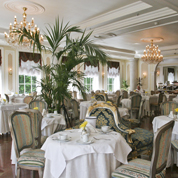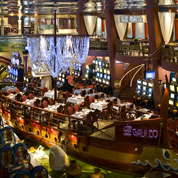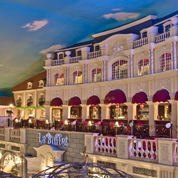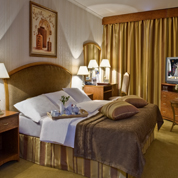Transformation of Korston into a leading hotel brand

Louie Beck — the vice president for hotel operations and general manager of Korston Hotel & Casino Moscow, one of the prime hospitality assets in the Russian capital — is a real connoisseur in hotel management. This is evident in his work at the hotel, where his over 30 years in the industry coupled with wealth of international expertise flavored with local market experiences gained from managing top-flight hotels have enabled him to quickly transform Korston into one of the most recognizable household brands on the Russian entertainment, casino and hotel services market. In this interview, Beck told TRCW about how he found himself in this exciting profession as well as Korston’s plans in the industry.
Hotel management is a very exciting profession. How did you find yourself in this business and how did you come to Moscow?
I did not choose this profession myself; it was the profession that chose me, and it is the only business that I have been doing for the past 30 years. There was a family reason for my choice of this profession because my father was a diplomat and journalist, and as part of his duties, he used to travel a lot from countries to countries, taking family members along with him. Usually, we stayed in hotels till we found apartments at his new postings, so I spent a lot of my childhood days in different hotels in different countries. Having grown up in hotels, it was only natural that I grew up to love the hospitality business. Besides, this profession fits me as a person, and I like the job as it enables me to interact with people from different backgrounds and cultures, and this always opens up new opportunities.
Before your relocation to Russia, did you have any prior knowledge of this country, its culture, language and ways of doing business here?
Yes, I have good knowledge of Russia because my mother is from Russia, my father is a Serb, and now I have a Russian wife. Besides, when I was small, I used to come here on vacations with my parents, and I continued the tradition when I grew up by vacationing here on my own. Now, I can say I have been from ‘coast to coast’ in this country. Besides, I had also worked in the CIS region, for instance, in Uzbekistan, where I ran a hotel for over two years. Therefore, when I first arrived here, I did not have those traditional problems that expatriates frequently encounter in foreign countries because Russia was not entirely new to me, as I already knew a lot about the country, the people, their lifestyles, cultures and traditions.
Based on this broad knowledge of Russia, how would you assess the changes that have taken place since your first visit several years ago?
There have really been great changes. Prior to my permanent relocation to Moscow, I used to visit Russia frequently, and at every visit, I was always surprised at the level of the positive changes taking place in the society. These changes are multifaceted, from the people to the economy, which is growing at a robust rate, to the hospitality industry, which has been developing very fast, and also in the level of education, which has always been traditionally very high. But this level has now risen to a new height, thanks to the unique combination of the best of the local and international practices and expertise.
As a manager of one of Russia’s popular hotel brands, how would you characterize the Russian hospitality industry today?
The Russian hospitality industry is a rapidly growing market, which is being boosted further by the strong demand for hotel services on the background of a robust economy. The Russian hospitality industry is quite unique, as it differs from the U.S., continental European and Asian hospitality markets because of its special traditions, environment and cultural experience. So, the unique blend of these factors is influencing the generally positive trends on the local market.
 How would you evaluate the Group’s position on this market, and is this current position commensurate to its potential and vision for the Russian hotel market?
How would you evaluate the Group’s position on this market, and is this current position commensurate to its potential and vision for the Russian hotel market?
The Group is a 100% Russian legal entity, and I’m very proud about it being a Russian company with international flavors. We are investing seriously into the market and the Russian people because we believe in the future of this country. I consider our position in our niche very sound, as the Group is growing fast and doing its best. But this does not mean that we are going to rest on laurels, because people, who are fully satisfied with whatever they do, do not have any future, as one should always strive for higher goals.
Why did you choose Kazan as the first point of the Group’s expansion outside Moscow?
Kazan, as a region, is a very good location, and some people even call it the third capital of Russia, after Moscow and St. Petersburg. Lots of high-profile local and international conferences, exhibitions, etc. are held in the city every year. The overall development of the region is evident and the local administration has been very supportive in terms of provision of modern infrastructural amenities. It is, therefore, not surprising that local and foreign companies are interested in the region. All these factors have also positively influenced the hospitality services sector, one of the reasons we have chosen Kazan as the first city in our expansion outside Moscow. And, I must say that our project there has been very successful since its launch over two years ago.
Using the Kazan project as a ‘case study’ on Russian regions, how would you characterize the perspectives of the Russian regional hospitality markets?
I would say that our Kazan project really shows the huge potential of the Russian regional markets. Indeed, our main focus is on the Russian market, with key emphasis on the regions. This is because we believe more in Russia as it has more travelers than anywhere in Europe, and the vastness of the country only helps to underscore the demand for high-quality hospitality services. We currently have projects in different stages of development in Lipetsk, Astrakhan and Yuzhno-Sakhalinsk, while negotiations are underway in Sochi, taking into consideration the Olympic perspectives, and several other strategically important major Russian regions. 
The level of competition in the Russian hotel industry, and specifically in Moscow, is very high. What is being done by Korston to stay ahead of its competitors in its market segment?
There is, indeed, a huge competition in Moscow, but I think this is good for the market, because the higher the level of competition, then the higher the level of services needed to retain clients. This, in turn, requires the management to search for new ways to do its business better — both for the investors, the guests and the employees as well, because qualified and dedicated staff is needed to successfully run this business. So, competition is healthy for all the parties concerned — the guests, the management and investors and also the staff. At Korston, we pay serious attention to the issue of HR development by investing seriously into personnel training.
A core part of the Group’s operations, as stated in its name, is gambling – casino business. How will the new gambling legislation impact on Korston’s operations?
Here, we need to understand one thing, and that is this law is an official policy and the government has a strong reason for adopting it. We trust their reasoning and we intend to abide by the law. With regard to Korston, I have to note that casino is just one aspect of our diverse entertainment programs. Therefore, I do not see the law negatively impacting on our business because the uniqueness of the Russian market in general, and its Moscow segment in particular, is that without the casino, most professionally managed hotels, which have casino as a part of operations, will still be doing good business after the law takes effect. This is because the national economy is robust, the business sector is strong and growing, and thus a lot of private and corporate events will still be on.
 Based on this answer, will it be right to conclude that Korston plans to operate casinos in the so-called ‘Las Vegas zones’ and, if yes, which of them will be your first location?
Based on this answer, will it be right to conclude that Korston plans to operate casinos in the so-called ‘Las Vegas zones’ and, if yes, which of them will be your first location?
Definitely, yes, that is right. We plan to operate gambling business in these zones. Our first location will be the first among the four zones that will be ready for such investments. Here, the issue of proximity to Moscow and/or other large cities is totally inconsequential.
As a manager of one of Moscow’s top hotels you must be very busy. That notwithstanding, do you have free time to explore the city and country, and if yes, what are your favorite places?
Russia has a lot of tourist attractions, from historical and religious places to cultural aspects such as theaters, opera and ballet, etc., and huge territorial landmass with its countryside beauties, from Kaliningrad in the West to Vladivostok in the Far East. They are so many that even if you spend everyday visiting these places, you will still not have enough time to get to all of them. This is always our main problem every time, I take my family to some of these places and events as there are always many events and very little time, because the weekends always seem to be exceptionally too short to accommodate all our plans.












 Web design,
Web design,